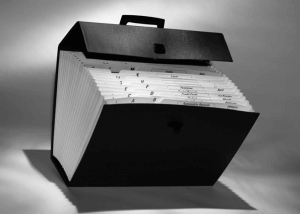Keeping the proper records so you can determine and substantiate the amount of various deductions is a task that does not need to be daunting. Here are some tips on what is needed.
For all deductions remember just keeping a bill is not enough. The IRS will want proof that the bill was paid. Generally acceptable records include canceled checks, bank or credit union statements, and credit card statements. Statements need to clearly state who was paid, the date, and the amount paid.
Medical Deductions
1) For medical and dental expenses receipts that state what the payments were for is important.
2) Remember to keep track of all copayments.
3) If you pay for your insurance outside of your job or if your insurance payments are not “pretax” keep a record of all insurance payments.

4) You are allowed to deduct mileage, tolls and parking related to medical treatments. Keep track of where you went to doctors and how many trips.
Taxes
1) Your w-2 is the record of how much state taxes were paid through withholding
2) If you make estimated payments, have a balance due or made a payment for a prior year keep the check, receipt or electronic record.
3) If property taxes are paid with your mortgage you should receive a statement of the amount of taxes paid. Otherwise you will need to keep a receipt for all property tax payments.
4) As of now sales taxes will not be an allowed deduction for 2014 and forward.
Interest
1) You should receive a Form 1098 from your lender stating mortgage interest you paid during the year and any deductible points you paid.
2) If you have a seller financed mortgage you need to have the name, address and SSN of the person you pay the mortgage to. You also have to keep track of how much interest was paid.
Contributions
1) If the contribution is less than $250 you will need to keep the check, statement or receipt.
2) If the contribution is greater the $250 the organization should provide you with a statement of your contribution.
3) For all non-cash contributions you should get an itemized receipt from the organization.
4) If the non-cash contribution is for over $5,000 a written appraisal is required.
Unreimbursed Business Expenses
1) You should keep both a receipt showing what the purchase was for and the record of the payment
2) The best way to track mileage deductions is in a log. Although The IRS does not require you to keep your mileage records in any particular format.
Casualty and Theft Losses
1) For a casualty loss, your records should show all the following.
a) The type of casualty (car accident, fire, storm, etc.) and when it occurred.
b) That the loss was a direct result of the casualty.
c) That you were the owner of the property or, if you leased the property from someone else, that you were contractually liable to the owner for the damage.
d) Whether a claim for reimbursement exists for which there is a reasonable expectation of recovery.
2) For a theft loss, your records should show all the following.
a) When you discovered that your property was missing.
b) That your property was stolen.
c) That you were the owner of the property.
d) Whether a claim for reimbursement exists for which there is a reasonable expectation of recovery.
Gambling Losses
1) Gambling losses can only be deducted to the extent of you winning.
2) It is important to keep an accurate diary or similar record of your gambling winnings and losses.
3) To deduct your losses, you must be able to provide receipts, tickets, statements or other records that show the amount of both your winnings and losses
